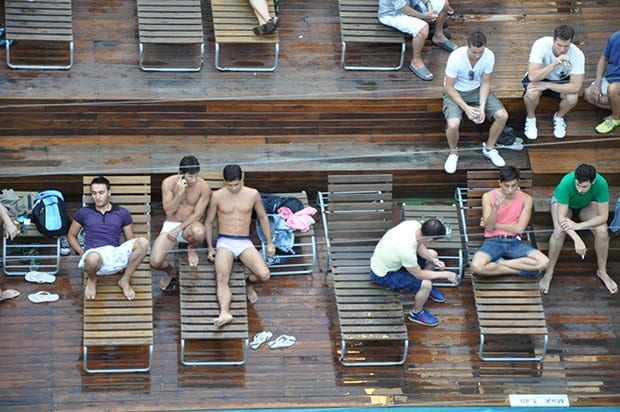
Boys hang out poolside at the Axel Hotel. Credit: David Walberg
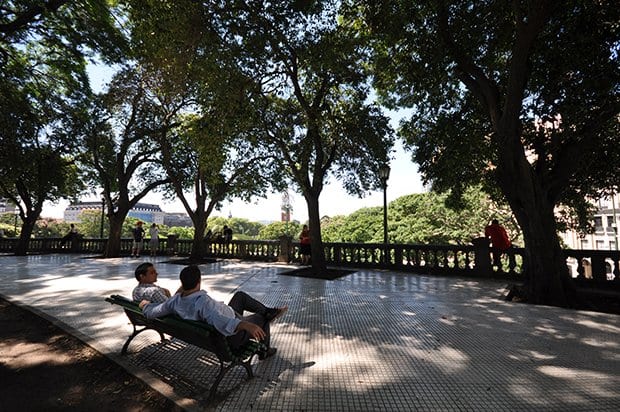
Grand, sprawling parks match the city's relaxed but elegant vibe. Credit: David Walberg
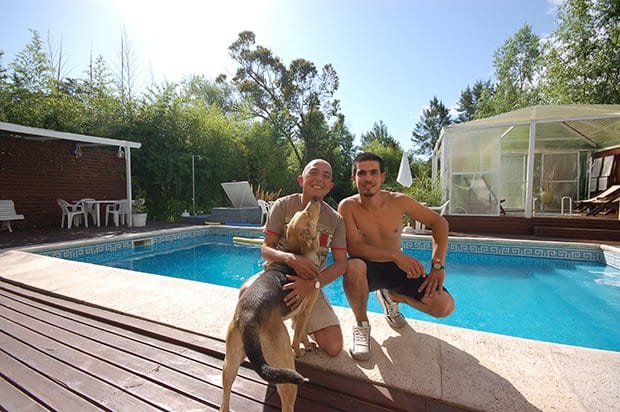
Raul, Diego and trusty dog Chino, are your hosts at La Favela, a gay guesthouse in the Paraná delta. Credit: David Walberg
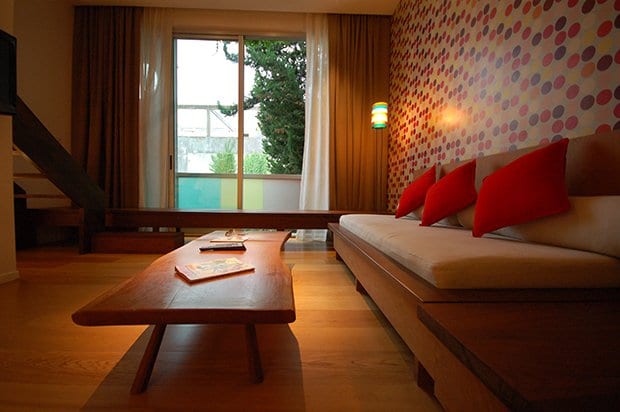
Vitrum is a funky hotel in a great location. Credit: David Walberg
When the Argentine president, Cristina Kirchner, signed the country’s same-sex marriage bill into law last year, it capped off a quarter century of galloping gay rights progress. How did the country move so swiftly from a homophobic dictatorship and economic collapse to become one of the world’s leading gay meccas?
A clue can be found on a visit to the Paraná River delta near Tigre, a town named after the jaguars that once prowled its shores. Less than an hour by boat up the Río de la Plata from Buenos Aires, the delta is a vast collection of islands at the convergence of two major rivers.
The delta has become a high-end spa destination in recent years, but the gays were among the first to arrive, fleeing police persecution — including murder — during the dictatorship in the late 1970s. Surely a new speed record for gentrification was set two years ago, when this former gay hideaway’s luxurious amenities drew a visit from Madonna and her children.
Despite the area’s new celebrity appeal, the gay scene stays true to its humble, local roots. During the dictatorship, police routinely harassed and arrested gay men en masse, and homosexuals were among the “disappeared” — people who were rounded up and never seen again. It’s believed that many of them were drowned in the same river they chose for escape, pushed overboard from boats or out of helicopters in the middle of the night.
“During the dictatorship, there was only one place where you could breathe fresh air for gay people,” says Osvaldo Bazan, Argentina’s most prominent gay historian. “It was the delta. Many of them looked for shelter there.” In the pleasure-loving spirit of Argentine culture, they chose for their refuge a beautiful oasis, a secret paradise. “There were even Carnival parties,” says Bazan, “and even if it was not allowed, they could live more free there.” The area was not patrolled by the police, only the less menacing prefectura, the marine authorities. On the occasions when the prefectura came around, the men would simply jump in the river and swim away.
In the years after the dictatorship, the Tres Bocas area of the delta became know for its elaborate Carnival boat procession, and now it’s a relaxing weekend getaway for gay men from the city. But the community remains connected to its unique historical roots. “Today, there’s a lot of elderly guys living there — gay people,” Bazan says, “because they moved in and then they stayed.”
The pace of Tres Bocas is sweet and slow. A number of gay guesthouses are tucked away. The streams and canals that run between the islands provide an endless maze for lazy boating or strolling along the boardwalks that line the shore. Overgrown greenery creates a jungle atmosphere that is occasionally interrupted by decks and benches and exquisitely manicured flower gardens. Tres Bocas is popular with porteños, as Buenos Aires residents are called, but virtually unknown to tourists. This corner of the delta remains a secret hideaway, once for survival, now for serenity.
Back in the city, Buenos Aires hums with gay activity. Porteños keep up the Latin tradition of partying till dawn, but without what one would assume is the requisite parallel tradition of afternoon siesta. When do they sleep?
Restaurateur Carlos Daniel Franco has expanded his Pride Café from its inaugural San Telmo location (Balcarce 869) with a second corner perch in Palermo Hollywood (Humboldt 1897). Down the street, Fernando Entin’s gallery, Elsi del Rio, exhibits work from a roster of gay artists that includes his partner, José Luis Anzizar. Emerging artists like Gustavo Piñero, whose sculptures of violent youth gangs are disturbingly cute and creepy, are catching international attention. In the neighbouring shopping district of Palermo Soho, partners Pablo Dastres and Adrian Campos run Adonis, a shop featuring sexy gay underwear.
Even these overtly gay venues enjoy a clientele of mixed sexual persuasions, just as so-called straight bars and clubs enjoy the patronage of gay men and lesbians.
“The gays in Argentina are more mixed and integrated. If you want to go dancing, you don’t need to go to the gay disco. You can go to any disco and you will find gays there,” says Bazan, who sees this fluidity as a product of the dictatorship. “Between 1976 and 1983, Argentina was not in the world. It was like there was no Argentina. What happened in other parts of the world, like the making of gay neighbourhoods, here it doesn’t even exist. We jumped over that process… because of the dictatorship. It’s not a good reason, but now we are in a new state that is more mixed, more integrated. I think that it is better.”
It helps that Argentines are a sensual people seemingly at ease with sex. A visit to a tango show — even the mainstream glossy affairs — reveals a tradition that elevates brazen carnality to an art form. Tango has become a national treasure without losing its raw heat and brutal sexuality.
Gay expats and retirees have been relocating in Buenos Aires for the better part of a decade, drawn by the city’s gay pride as well as its relaxed lifestyle. The city has the good bone structure of Paris — beautiful parks, vast promenades and delightful belle époque architecture — and Rome’s dolce vita — a relaxed attitude that favours leisure and pleasure. It is said that Buenos Aires is a Spanish city full of Italians who think they’re French. Somewhere in this mix, the gays, too, have made their home.
STAY GAY
La Favela B&B
La Favela, in the Paraná delta, is a three-bedroom bed and breakfast popular with Buenos Aires residents. On Sundays, people come for the day to celebrate with a big feast and pool party in the expansive back garden. Co-owner Raul is a master of the parilla, deftly manoeuvring a dizzying sizzle of steaks and sausages around the grill. favela-delta.com.ar
BA4U Apartments
Renting an apartment is a great way to immerse yourself in the city and its neighbourhoods. The verdant Palermo and chic Recoleta districts are particularly popular with visitors. The rental agency BA4U specializes in sourcing gay-friendly accommodation. Proprietor Ralf Holbeck, a German who came to Buenos Aires by way of Greece and Australia, provides helpful orientation to the city, dispensing advice and opinions on gay bars, restaurants and activities. ba4uapartments.com.ar
The Axel Hotel
The Axel Hotel is the big gay hotel in town. It’s part of the chain that has locations in Berlin and Barcelona. You don’t need to be a guest to check out the pool party every Sunday from 6 until 10pm. Tourists from around the world mingle with cute locals. Bring your trunks if you care to take a dip. axelhotels.com
The Vitrum Hotel
The Vitrum hotel is a comfortable and groovy spot with an excellent city location, straddling the nightlife hub of Palermo Hollywood and the gay residential neighbourhood of Palermo Soho. An open-concept main floor combines reception, lounge and restaurant in a stylish and airy atmosphere while the rooftop is an indoor-outdoor spa. Rooms are appointed with well-chosen furniture, from modern design classics to funky one-of-a-kind finds. vitrumhotel.com
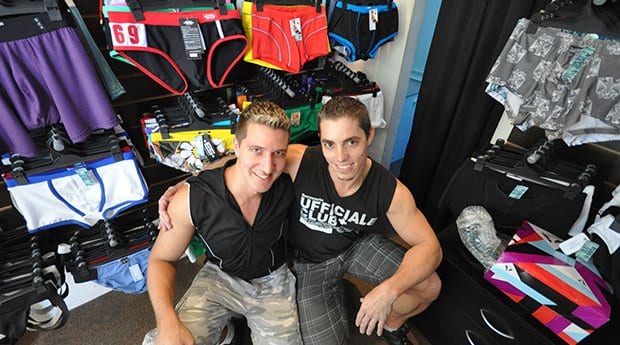
 Why you can trust Xtra
Why you can trust Xtra